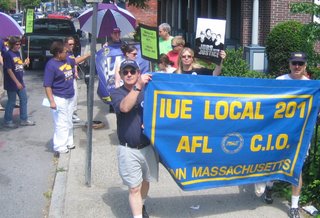Hooksett GE employees want a new voice for workers
Time for a Seat at the Table…
Hooksett GE employees gathered on March 14 to begin building a new Working At GE (WAGE) Committee here. WAGE committees can represent employees with legitimate grievances, work with management to fix on-the-job problems and be a voice for our interests as workers. WAGE is an association, not a union.
Frustrated by deteriorating conditions, the idea for a Hooksett WAGE Committee emerged after several employees met with Local 201's Ric Casilli on Feb. 25. Casilli is on the IUE-CWA – GE National Negotiating Committee and is a veteran of three previous national contract negotiations with GE.
Possible role in national contract talks?In past years, other WAGE committees have sent representatives to attend national negotiations in New York. One outcome of forming a local WAGE committee could be a similar opportunity for us. Contract talks are set to begin on May 21.
To our co-workers at Hooksett:
Are you sick and tired of what management is getting away with here at Hooksett?
It won't change unless we change it.
Please join us on Wed., March 28 to work together for more dignity and respect. Second shift: 2:00 – 3:00 PM. First Shift: 3:30 – 4:30 PM. Third shift may attend either meeting.
The meeting will be held at the Plumbers Hall, 161 Londonderry Turnpike in Hooksett. All are invited!
Participation in WAGE is protected by federal labor law!
A New Voice at Work…
Fairness and respect for all employees are top concerns of Hooksett WAGE Committee!
When Hooksett workers met on March 14, we had a wide ranging discussion about some of our major on-the-job concerns.
While everyone has their own gripes and pet peeves, the most important concern was a sense that local management is too focused on the "needs of the business." It needs to be balanced with making Hooksett a good place to work where everyone is treated with the dignity and respect they deserve.
Some of the top issues that united all of us were:
• Hooksett absentee policy. Local interpretation of the policy is unreasonable. For example, if we miss three days in a row, it's three "occurrences." Like other locations, it should only be one "occurrence" for each absent period.
• Personnel policies. Our rules and procedures should be spelled out and adhered to. Instead, we have a "chalkboard" employee handbook that can be changed any time. It is applied as management sees fit, with too many hidden, unwritten rules.
• Production quotas. The policy of posting our names and production output is divisive. It leads to poor quality and is an incentive to mis-voucher.
• Job combinations. If we are asked to do more, then our skills should be rewarded at higher rates.
• Training opportunities. We should be offered more training so we can upgrade to better jobs.
• "Needs of the business." Why is it constantly used to justify why no one can upgrade?
• Health and safety. When someone is injured management shouldn't "blame the victim." And we shouldn't have to complain five times to get a problem fixed!



